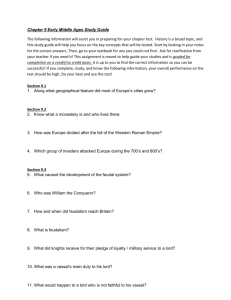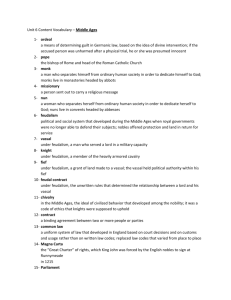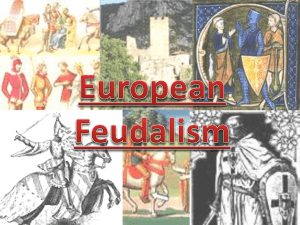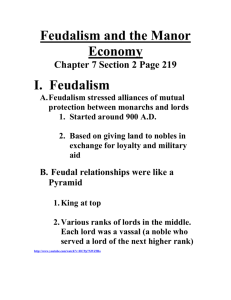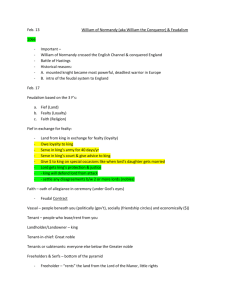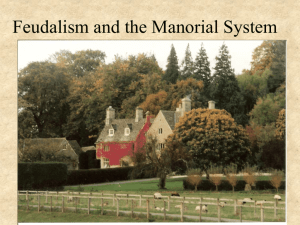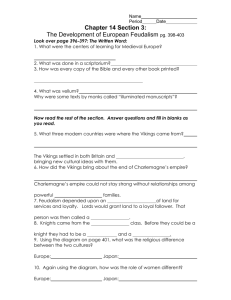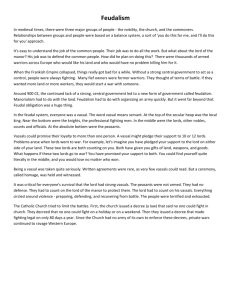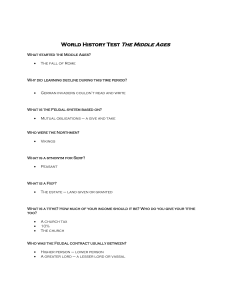Feudalism
advertisement
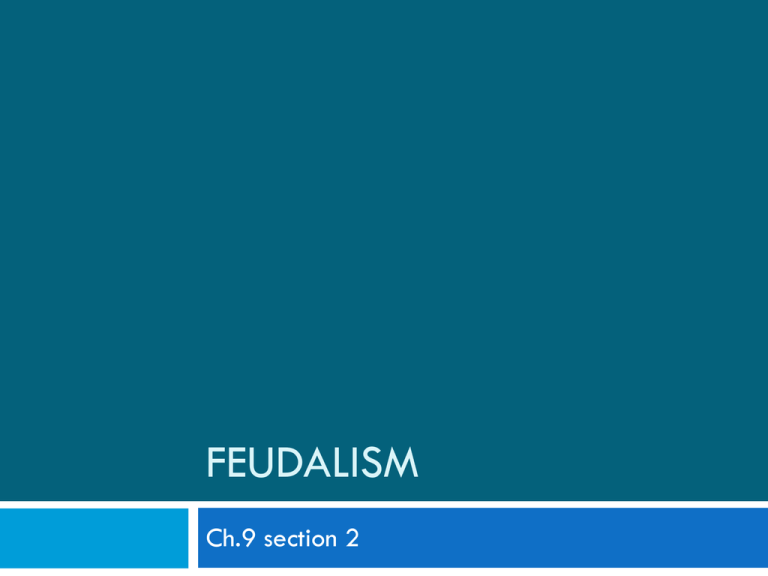
FEUDALISM Ch.9 section 2 The Invaders Carolingian Empire began to fall apart soon after Charlemagne’s death (814) Divided into three major sections: The west Frankish lands The eastern Frankish lands The middle Kingdoms Local nobles gained power Invasions added to the falling Invaders cont. Magyars People of western Asia At the end of the 9th century moved into central Europe (Hungary) and invaded western Europe Vikings Great love of adventure, search for spoils of war, and new avenues for trade may have led to attacks in other areas of Europe Warriors, superb shipbuilders, and sailors Enabled attack places far inland Mid-9th century building European settlements invaders In 911, west Frankish king gave a group of Vikings land forming a section of France that became Normandy Deliberatly planning to convert to Christianity which made the Vikings part of European civilization The Development of Feudalism Attacks and invaders caused people to turn to nobles to protect them Usually a powerful lord that could offer protection in return for services Led to feudalism– a political and social system Vassalage- warriors fought for their lords and the lords to care of the warriors needs Vassal- a man who served a lord in a military capacity Knights- heavily armored calvery Great social prestige and back bone of the aristocracy The Development of Feudalism Powerful nobles took control of large areas of land To get men to fight for them they would grant each vassal a piece of land to support him and his family Since there was little trade at this time and wealth was based primarily on land, this was an important gift The Feudal contract The relationship between lord and vassal was made official by a public ceremony To become a vassal, a man performed an act of homage “The man should put his hands together as a sign of humility, and place them between the two hands of his lord as a token that he vows everything to him and promises faith to him; and the lord should receive him and promise to keep faith with him. Then the man should say: ‘Sir, I enter your homage and faith and become your man by mouth and hands [that is, by taking the oath and placing his hands between those of the lord], and I swear and promise to keep faith and loyalty to your against all others’ The Feudal Contract cont. Loyalty to one’s lord was the chief virtue Fief- the granting of land to a vassal Vassals that held fiefs came to hold political authority The feudal system became increasingly complicated The lord-vassal relationship bound together greater and lesser landowners. Honorable relationship between free men and implied no sense of servitude Feudalism cont. Came to be characterized by unwritten rules– feudal contract Determined the relationship between a lord and his vassal Major obligation was to perform military service usually 40 days a year When summoned would have to appear to give advice to the lord Also responsible to make financial payments for various occasions Feudal contract cont. The lord also had responsibilities towards the vassal Granted land Required to protect his vassal Either defending him militarily or by taking his side in a court of law The Nobility of the Middle Ages Dominated by men whose chief concern was warfare Nobles would include: kings, dukes, counts, barons, and even bishops and archbishops who had large amounts of land and political power Formed an aristocracy that consisted of people who held political, economic, and social power Social divisions based on extremes of wealth and land holdings The nobility of the middle ages cont. Tournaments– contest where knights could show their fighting skills Began to appear in the 12th century Late in the century dominated by the joust Individual combat between two knights Used to train for war Chivalry– an ideal of civilized behavior among nobilities Code of ethics knights were supposed to uphold In addition to their oath to defend the Church and defenseless people nights were to treat captives as honored guest Knights should only fight for glory and not for material rewards Aristocratic Women Could legally hold property, but most remained under control of men Lady of the castle had to manage the estate when lord was away at war or court Large amounts of officials and servants Oversaw financial accounts and food supply and maintained other supplies for smooth operation Aristocratic Women cont. Expected to be subservient to husband Many were strong women who advised and even dominated the husband Eleanor of Aquitaine Remarkable personality Heiress to the duchy of Aquitaine in southwest France Married at the age of 15 to King Louis VII of France Not a happy marriage and was annulled Eight weeks later married again to Duke Henry of Normandy, who became King Henry II of England Stormy relationship Spent much time in Aquitaine Eight children Richard and John became kings of England

